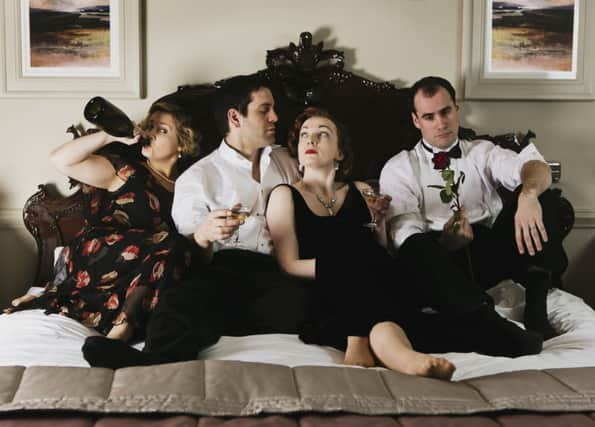Theatre review: Private Lives, Edinburgh Lyceum


LOVE is the greatest thing, except when it’s absolute hell. Noel Coward’s 1930 masterpiece Private Lives is a play about people with nothing to do except live for pleasure. Yet out of their frantic, privileged quest for happiness and meaning, he spins a superficially gorgeous but underlyingly deep and brutal human comedy about the danger and high risk of trying to build your life around another human being, however fascinating that person may be.
The famous first scene of the play therefore finds divorced couple Elyot and Amanda, on honeymoon with their respective second spouses Sibyl and Victor, discovering that they are occupying adjacent rooms in a seafront hotel at Deauville. In Martin Duncan’s sparkling new production at the Royal Lyceum, the hotel and its balconies are brilliantly realised in a cleverly-angled towering set by Francis O’Connor, all sleek white modern architecture in the style of a transatlantic liner. Amanda’s flat in Paris, the scene of the second and third acts, is likewise a stylish dream of a studio filled with art deco furniture in strong colours. And the clear bold lines of the set are echoed in the performances of Duncan’s cast, led by Kirsty Besterman and John Hopkins as a scratching, biting, fast-punching Elyot and Amanda – all suave aristocratic manners one minute, and fierce domestic violence the next – with Emily Woodward in fine form as a small, blonde, fiery and unsually entertaining Sybil, and Ben Deery suitably stalwart as Victor.
Advertisement
Hide AdJust what it all amounts to, in this smartly-dressed remount of one of the world’s most familiar plays, is little harder to say. Coward’s brilliant one-liners trip off the tongue, sometimes sounding a little harsher and less funny than they can do. Elyot and Amanda learn all over again that their passionate mutual obsession has a dark side, ugly, snarling and possessive. The production has a kind of all-purpose elegance that could just as well be rolled out on any rep stage in Britain. Elyot and Amanda are also a well-matched pair, an odd premature vision of complete sexual equality, in an age when feminism seemed all but dead. Just what they tell us, though, about the way we live now, remains obscure this time around, except that if we are truly in love with our partners, we are likely to hurt them badly from time to time, and to be hurt by them, too.
Rating: * * * *